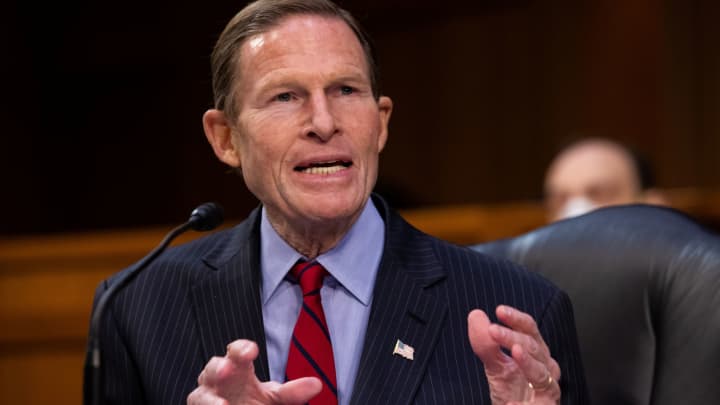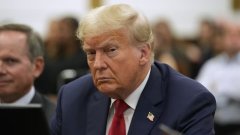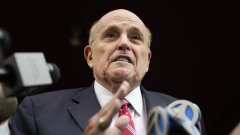
WASHINGTON — Bipartisan members of a Senate subcommittee on homeland security Wednesday from a Saudi Arabian investment fund at its second hearing on the to merge PGA Tour and Saudi-backed LIV Golf.
"Saudi Arabia's bid to buy professional golf in America is not just one investment in a vacuum," Sen. Richard Blumenthal, D-Conn., chairman of the Permanent Subcommittee on Investigations, said on Capitol Hill. "It is instead part of a web of growing investments in this country. They are largely unknown and they are almost entirely without oversight."
Blumenthal announced that he had issued a on Wednesday to USSA International LLC, the PIF's wholly-owned U.S. subsidiary, for documents related to the PGA Tour-LIV Golf deal and other U.S. investments.
Blumenthal and witnesses at the hearing accused Saudi Arabia of mirroring other authoritarian regimes like China and Russia by exploiting loopholes in certain investment platforms to spread their influence and exert soft power within the United States.
"At its core, then, this is not a business deal," said Benjamin Freeman, director of the Democratizing Foreign Policy Program at the Quincy Institute for Responsible Statecraft, of the PGA-LIV deal. "This is an influence operation. It's meant to shape U.S. public opinion and U.S. foreign policy."
According to Joey Shea, a Saudi Arabia and United Arab Emirates expert at the nonprofit Human Rights Watch who testified Wednesday, the PIF "has been ranked as amongst the least transparent, least accountable and with the least credible governance structures in the world."
PIF and LIV didn't immediately respond to a request for comment. A PGA Tour representative declined to comment.
Read more of CNBC's politics coverage:
Holdings by the Saudi Public Investment Fund — an entity controlled by Crown Prince Mohammed bin Salman that backs LIV Golf — in entertainment, electronic vehicles, gaming in the U.S. and more have grown from around $2.5 billion in 2018 to , according to the committee.
The Saudi government has been heavily investing in sports worldwide in recent years.
PIF has been recruiting top soccer players from Europe to Saudi Arabia with boatloads of cash. Brazilian soccer star Neymar an offer this summer reported to be worth , according to NBC Sports. He followed soccer legends Cristiano Ronaldo and Karim Benzema, who have also secured contracts said to be worth hundreds of millions of dollars to play in Saudi Arabia's pro league.
The fund also Lionel Messi, but he ultimately accepted an from Major League Soccer in the United States.
Blumenthal said the government's current laws on reviewing foreign investments overlook commercial holdings by foreign governments.
"As I wrote to (Yasir Al-Rumayyan,) the governor of the PIF last month, it cannot have it both ways," Blumenthal said. "If it wants to engage with the United States commercially, it must be subject to United States law and oversight."
In June, the PGA Tour and LIV a deal to bring the two golf leagues together that shocked the sports media world. Many critics, including those on Capitol Hill, have accused LIV, of "sportswashing," or spreading influence through sports in an effort to draw attention away from human rights violations.
A month after the deal was announced, PGA Tour officials the Senate subcommittee to defend the deal with LIV, insisting that the Tour, and not the Saudis, would be the primary beneficiary of the deal. Representatives from LIV and PIF were also invited to testify, but they did not agree.
The proposed deal – which so far only has a would create a for-profit subsidiary of the Tour, which would manage competitions – squashed the pending litigation between the two entities.
While the PGA Tour has said it would be in the driver's seat if the deal came to fruition, PIF has said it's prepared to invest billions of new capital into the new entity.
Prior to the proposed deal the two organizations had filed a series of antitrust claims against each other. LIV had sued the Tour alleging anti-competitive practices for banning its players, while the Tour countersued claiming LIV was stifling competition.




